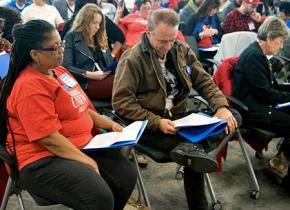What kind of alternative for Chicago?
reports on the conference of a labor- and community-backed independent political organization--and what its future could look like in a one-party town.
AROUND 150 activists from unions and community organizations met in Chicago on October 17 to approve "principles of unity" for United Working Families (UWF), which describes itself as an "independent political organization, founded in the summer of 2014."
Two unions, the Chicago Teachers Union (CTU) and SEIU Healthcare Illinois & Indiana; and two community organizations, Grassroots Illinois Action and Action Now, launched UWF as a political vehicle in a local political system dominated by the neoliberal Democratic Party.
"We were founded to challenge the corporate dominance of the existing two-party system, to lift up the voices of working people and their families and communities," read a UWF statement distributed to participants at the meeting. As CTU and UWF staff member Matthew Luskin told the meeting. "We've got nowhere to go unless we build something of our own. We need our own political home."
Tara Stamps, a CTU member and UWF-endorsed candidate for Chicago City Council last February, said that voters have "got to know that they have a viable alternative" to the Democratic Party. She said that UWF needed to build an organization that was "unafraid, unbought and unbossed."

In a matter of months after its founding, UWF collected more than 35,000 signatures to place a referendum for an elected school board on the ballot in 37 of Chicago's 50 wards (City Council districts). The referenda passed overwhelmingly in the municipal elections earlier this year.
In the February elections, with runoffs held in April, UWF also played a major role in organizing support for challenger Jesus "Chuy" Garcia in his unsuccessful bid to unseat incumbent Mayor Rahm Emanuel, as well as for a small number of independent candidates for City Council.
THE OCTOBER 17 meeting brought together representatives of the founding organizations, new organizations and individual UWF members to debate a seven-point platform. The platform, the product of a UFW committee appointed by the organization's board of directors, included a number of very solid, pro-working class demands in support of public education, public services, health care, housing, jobs and wages, and racial justice.
Attendees broke into discussion groups on each of the seven points to debate and to put forward to the larger group resolutions to change the original text. Then the entire meeting voted to approve each platform plank as amended.
While many of the resolutions added specific policies or changed language in the platform, two results of the smaller group consultations stood out. Members of the groups discussing health care and racial justice advocated that the meeting agree to add an additional plank on gender and LGBT issues. Another proposal from the floor of the convention advocated a plank on environmental issues. The assembly approved adding both the gender justice and environmental points to the platform, directing UWF's board of directors to draw up the language.
Second, the group on independent political action proposed two resolutions. The first, proposed by CTU member Kirstin Roberts, stated that the UWF should declare its aim to form a political party to run candidates against the Democrats and Republicans. A second resolution, offered by Luskin and UFW and Justice Party member Lenny Brody, endorsed the idea of UWF taking the first steps in a long-term campaign to promote the idea of a third-party alternative.
In the event, both resolutions passed, with the assembly voting down a proposal to replace the "form a political party" resolution with the "taking the first steps" resolution.
While these two resolutions might seem at odds, they represent a contradiction at the heart of UWF. It's positive that hundreds of activists gathered to debate and discuss what they would like to see as a working-class political alternative in Chicago and Illinois. The meeting showed that hundreds of activists for education justice, affordable housing, the fight for the $15 minimum wage and other campaigns want to challenge the political status quo.
While the desire for an alternative was palpable, the logic of "lesser evil" support for the Democratic Party still dominated, especially among representatives of the institutional supporters of UWF, like the CTU, SEIU Healthcare and Grassroots Action Illinois.
Even though the Democratic establishment in Illinois and Chicago is largely responsible for the pension crisis, school closures and police brutality--all of the issues that spurred people to attend the meeting--many still hold to idea that UWF should help elect "good" Democrats.
In fact, one of the UWF-endorsed independent City Council candidates who defeated a machine alderman, CTU member Susan Sadlowski Garza, has recently announced her candidacy to run for 10th Ward Democratic Party committeeman. Obviously, it's difficult to maintain "independence" from the Democratic Party if one is an official of the party. Sadlowski Garza did not attend the October 17 meeting.
With a right-wing Republican governor holding the state budget hostage to his right-to-work agenda, with the Democrat-dominated General Assembly looking for ways to slash state workers' pensions and with Emanuel and his City Council minions trying to impose more austerity on city workers and taxpayers, the stage is set for many political battles to come.


